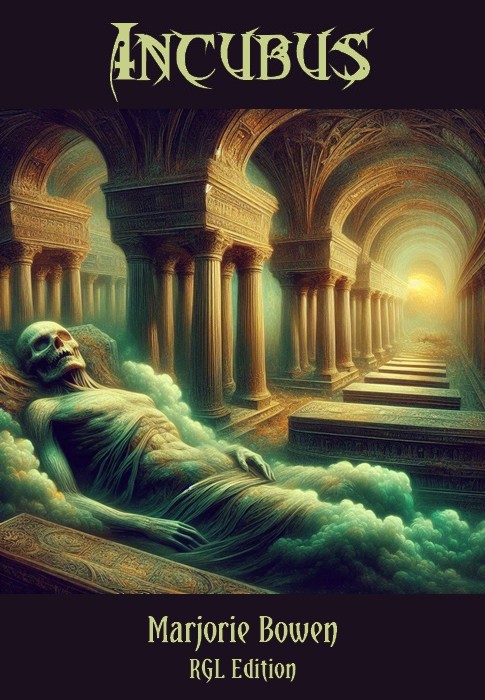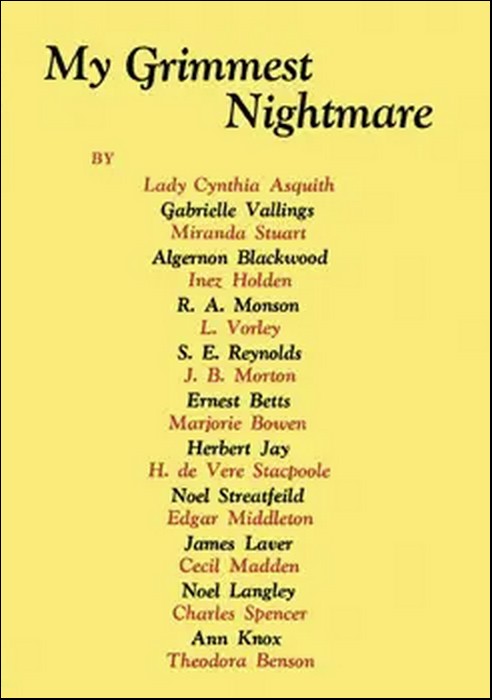
RGL e-Book Cover©
Roy Glashan's Library
Non sibi sed omnibus
Go to Home Page
This work is out of copyright in countries with a copyright
period of 70 years or less, after the year of the author's death.
If it is under copyright in your country of residence,
do not download or redistribute this file.
Original content added by RGL (e.g., introductions, notes,
RGL covers) is proprietary and protected by copyright.

RGL e-Book Cover©


"My Grimmest Nightmare," with "Incubus"

THE guide said that it was very late in the year for visitors, but he allowed us to enter; the tall iron gate was slightly rusty and over it was a coloured statue with a starry crown. The sombre woods came down so close and thick to the garden wall that they seemed to be pressing into the walks and to be held back only by force.
This gloomy spot was, our guide said, hallowed; a heathen temple had stood there before the building of the monastery, and that was a long, long while ago. A deep restless curiosity had brought me to the place; I had been there for nights in succession in dreams, when the black forest had been flowing about me like waves and I had searched in vain for the walled vineyards, the long deserted buildings, the desecrated chantry with the echo, the church where the great wine butts stood.
It had been a sad journey through the mist, along the sodden ways, under the dark trees; the motion of the lopsided hired carriage had almost lulled me back into my dream; the road through the wood was very obscure owing to the blue-black leafage of the firs—the pale light over the monastery grounds seemed startling by contrast. The vintage was over and the place was desolate; the sullen guide clanked his keys and hunched his shoulders as he preceded us. I looked at my companions; they had no interest in the scene and seemed detached from it; I soon evaded them, leaving them standing, gaping, with their handbooks grasped in cold fingers, irresolute in the garth where the dry sticks of dead flowers thrust above the stagnant grass.
I was anxious to find some of the melancholy places familiar to me from my dreams; I heard the guide's voice calling after me peevishly, but took no heed as I hastened away down the cloisters. He was soon distanced, and I was free of the desolate covered walk. I found a poignant interest in noticing the difference between the reality and illusion; in my dream the place had been larger, but not more mournful, the forest had come down even closer, the façade of the long dwellings, the pillars of the cloisters had been interchangeable with the strong moist trunks of the trees, and the twisted undergrowth or shrub that was tangled into sombre recesses fit for a wild animal's lair.
I found a bitter satisfaction in confirming the solidity of my surroundings; the harsh walls were cold and damp to the touch, the cracked pavement rang beneath my feet, the dismal vistas followed the laws of perspective and did not dissolve and blend into the forest as I had feared they might do.
Someone had told me of the little sunken chantry with the powerful echo; I found it and entered.
It was very dark; a dull light streamed through the broken tracery of the narrow windows. There were mutilated masks on the spandrels, thick toadstools grew on the stone seats of the monks and showed like stale foam on the entablatures. I tested the echo, whispering: "Who has been worshipped here?" There came back to me like the roll of muffled drums—"worshipped here!"
I had heard tales about what used to try to come in from the woods, and the prayers the monks put up to keep them out; a nameless altar, deep in corruption, had been discovered beneath the old wall that kept out the woods, and there was no reasonable explanation of some of the carvings in the dormitories—who was the woman with the two children seated on the waxing moon, and who might be the thin morose man with the boar's head on his shoulder who lowered in his niche by the north door? I had heard tales, but I could not sort them one from another then—I was too eager to quench my curiosity while I had the opportunity. The echo pursued me as I hastened out of the chantry along the cloisters and out into the open air again.
The comfortless sky was veiled, the surly air heavy, round about me glided the dead leaves from the decayed limes supported by iron props and chains that edged the great courtyard where I found myself;
The cold increased and I thought by the crackle under my feet that the ground was glazed with ice.
Three sides of me were the fronts of the monastic buildings with windows that looked into empty rooms; they had used the convent for a prison after the monks were expelled, and then for a hospital for lunatics; there were chains fastened to the walls in every cell, they said; on the fourth side of me was the church; the last of the dried and frozen refuse of the grapes was over the steps, the red imprint of the grape-crusher's feet showed on the dusty stone, the hooded steeple went up very high, I thought, into the cold vapours that were hastening up from the unseen river.
I was afraid, now that I had after exceeding toil reached my goal, that I should find the great door closed, but it yielded to the pressure of my hand and I slipped into the church.
The huge winepresses stood between the pillars and cast shadows that met in the centre of the aisle; clear glass had been put in the windows, but the visionary light seemed, with every second, to fade. Nothing remained of the holy furnishings that I remembered so well but the statues painted life-like that rested against the eastern wall; they appeared to be sainted bishops with mitres and haloes, vestments and croziers, but to look behind them was to discover the fraud—they were sawn trees and hollow with age and decay. Like the midnight music with which I was so familiar was a potent whispering in my ears—I supposed that it came from those chained lime-trees without. On the site of the altar I found him; how could I have forgotten the appointment we had?—I, who had prided myself on my constancy. This meeting had been the purpose of all my dreams; a dreadful anxiety pinched my heart that, after all, everything might go amiss.
He was stretched patiently on his tomb, sprigs of hay were scattered over his stone cloak as if they had bedded some animal by his side, the stale musty perfume of the vintage lees was in the air—or was this the scent of the dregs of the wine that had once spilled from the altar chalice?
A sense of my unutterable loneliness overwhelmed and dismayed me; I had wandered so far, I had been lost for so long; I had no hope that any anodyne would ever assuage the deadly nostalgia that tormented me. If I could have had either complete oblivion or perfect memory! But how could I endure this twilight of distorted recollections and uneasy slumbers? I was at the dead neaptide of joy.
It was the sense of eternity that was so oppressive, time seemed to hang on me like a lead weight, so that though I had arrived where I might never be again, I was too burdened to rejoice.
I touched his tomb; that was solid, the corners of the stone hurt the palms of my hands when I pressed them there; I could see the rude marks where some instrument had defaced his name—how anxious they were to conceal him from me and even from a casual, curious gaze! I picked up a handful of hay—this had been a daisy and that a cornflower, that a blade of grass, that red-leaved sorrel.
The acorn is not yet formed that shall grow the oak that shall make the cradle to rock the wise man who shall solve my bewilderments for me.
I was aware of his loneliness impinging on my own; his utter desolation touched my sorrow like flame on a wound.
Forgotten by everyone but myself and I could not reach him; this was more than love, an essence too fine for the crucible of humanity that must escape in vapour or break the vessel that contained it; I looked at my hand laid on the tomb and was startled to see that it was, after all, the hand of a mortal woman.
The guide was calling outside the church; I heard his wheezy voice lamenting that dusk was falling and he could not clear the desolate grounds of the straggling sightseers.
I felt myself recede from his tomb as the shadows recede from the light—the sound of the human voice had cast me away from him to where I belonged.
Yet he had stirred too, raised himself to one elbow, and taken his head in his hand as if he would, at last, separate himself from his grave; but at the harsh rasp of the summoning voice he had chilled into stone again. I made a garland of the hay and wished the twisted flowerets would freshen into sap and lustre at my touch; I laid this wreath over his alabaster brows and left him; the shadows were now clustering in a thicket of fear behind the wine butts; I thought I saw nimble creatures moving there, keeping stealthily beyond my observation.
As I passed out of the church I saw the guide shambling ahead of me, shouting in a raucous voice into the swiftly falling dusk; the buildings looked sombre and rigid in the last light and an insistent wind was tugging at the chains on the drooping lime-trees.
I hastened after the guide, for I thought that some invisible menace was driving me forth, and that, for his sake, it would be better for me to go.
The guide greeted me sourly.
"You left it too late," he said. "You might have been locked in here for the night—and how do you think you are going to pass through the forest in the dark?"
I did not answer and he began to complain, childishly, of the things that came up out of the forest after nightfall; I smiled to think how little he knew of me.
The other visitors had gone; my carriage waited in the lee of the gate, man and horse asleep. The mist had lifted from the crystalline upper air. A heavenly star glittered in the midst of the chaplet of gilt metal constellations round the brow of the statue above the twisted ironwork.
The wood appeared so dense that it might have been solid; the trees were certainly pressing on the monastery garden walls as if they would invade and overwhelm the sacred, profaned place; one night, I thought, the trees will break through and in the morning there will be nothing but the forest, with no trace to mark where the monastery had been. Who then will find where he lies, sunk beneath so powerful an onslaught?
My driver lit his lanterns; he knew his way through the forest very well, and could, he said, find the road easily, even in the twilight hour.
It was very cold, but I would not have the hood up—the wool rug on which the dead leaves had fallen was sufficient for me; how odd to hear the old man lock the gates behind me, as if that could keep me out.
"Does he live alone in that vast, empty place?" I asked the driver.
"Not what you would call alone," he replied, "though there is not much human company."
We started off briskly—the glimmering light held until we reached the forest; there were fields either side, divided from the road by old apple-trees; the fruit had long since been plucked and the boughs looked stark against the sky, which was the colour of dead lilac flowers and pellucid as running spring water.
When we reached the wood it was different; with every roll of the wheels something scuttled out of our path into the blackness under the trees; the widening spokes of light from our lantern showed me strange creatures on the lower boughs of the firs or crouching on the ground.
I thought that they pitied my loneliness and my flight, yet I knew them to be utterly unsubstantial, mere wraiths of shade.
My driver spoke over his shoulder to bid me listen to the sound of the vesper bells that floated to us from a neighbouring village, but I could not hear them. The increasing darkness pleased me; I seemed to be travelling to the very centre of loneliness where I should meet him and our different desolations would be resolved at last into a common case.
The light of the carriage lamps fell over the front of the inn where I was staying and showed all the mottoes written in black Gothic letters over the stucco front beneath the carved gables and the wooden balconies.
I left the carriage and entered the inn; everyone was abroad; they would be, I knew, far away at some bright festival in a Christian fane where there would be scented lights, organ music, and grand singing; I thought of them with awe and dismay.
They had left a taper and candle for me in the entrance; I heard the carriage drive away into the forest as I saw the little flame spring from the hard wax; I went upstairs to my room; they had not closed the shutters and at every window I passed I saw the pine-trees, blackness on blackness with no chink to let in the starlight.
My casement was open on the forest; as I went to close it I saw him on the balcony, the garland of perished wildings still about his hard brows, his stone mantle covered the threshold of my room and he was much taller than he had looked lying on his tomb; a disc of light was between his eyes.
I knew then that this was no waking hour and the disappointment was profound, for I had resolved to put all to the test of reality.
"This is another dream," I sighed as I turned on my hard, straight bed and felt the memorial stone above me.
"Yes," he whispered. "But whose dream? Yours or mine?"
Roy Glashan's Library
Non sibi sed omnibus
Go to Home Page
This work is out of copyright in countries with a copyright
period of 70 years or less, after the year of the author's death.
If it is under copyright in your country of residence,
do not download or redistribute this file.
Original content added by RGL (e.g., introductions, notes,
RGL covers) is proprietary and protected by copyright.